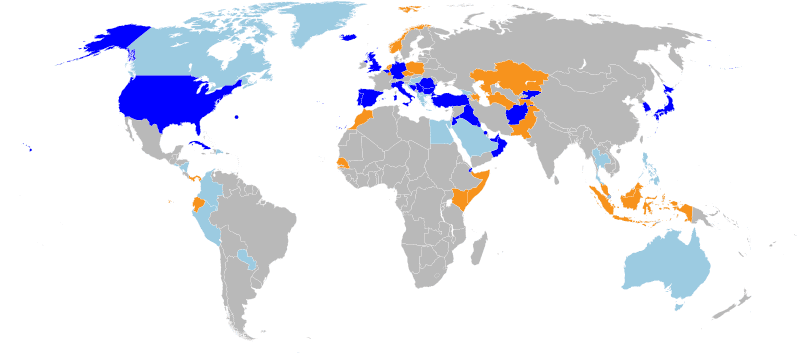Seven Questions For The Foreign Policy Debate That Aren’t Specifically About The Middle East

Since Larison is playing the game, I’ll play as well.
1) Mexican deaths from the war on that country’s drug cartels recently passed the 50,000 mark. The “war on drugs” has long since evolved from a metaphor to an actual and quite extensive operation of the American military. The drug cartels’ power derives primarily from American demand for illegal drugs, particularly marijuana. Is there any conceivable development in war on drugs that would prompt you to consider decriminalization of some drugs and a shift to harm-reduction as the primary national drug strategy? If so, what would that development be, and how is to be distinguished from the situation as it currently exists in Latin America? If not, in what way can the “war on drugs” be described as the result of a rational policy process?
2) American army bases in South Korea and Japan periodically present our country with diplomatic crises of one or another degree of seriousness, the most recent being the alleged rape of an Okinawan woman by two American servicemen. Both countries have long since passed the point where they have the material and organizational resources for national self-defense. If they are to be useful to America as allies, does it not make sense to encourage national self-reliance and for cooperation to be pursued on a bi-lateral basis between formal equals, as is our cooperation with allies like Britain, France, Canada, and Australia? And, if that is the case, wouldn’t closing our permanent bases in these countries aid in fostering that spirit? Regardless of your answer, what is the continued policy rationale for these permanent overseas deployment of American troops?
3) The prospect of a nuclear-armed Iran, whether it is a realistic short-term concern or not, quite reasonably concerns most observers. But within the last fifteen years, two other powers with far less-robust political systems and at least an equally substantial history of involvement in international terrorism – Pakistan and North Korea – acquired nuclear weapons. Inasmuch as nuclear proliferation poses a threat to international order, should we not be at least as concerned with promoting denuclearization in South and Northeast Asia as we are in tightening the screws on Iran? And, if that is the case, what incentives would you be willing to contemplate to promote a path to denuclearization?
4) What is the policy rationale for the continued embargo against Cuba? If the embargo were lifted unilaterally tomorrow, what negative consequences would accrue to America, other than embarrassment at having pursued this policy for so long after the collapse of the Soviet Union?
5) The first Secretary General of NATO said, in 1949, that the purpose of the alliance was to keep “the Russians out, the Americans in, and the Germans down.” What is the purpose of NATO today? Does America still have any interest in keeping the Germans “down” in the sense that Lord Ismay meant? Do we still have a substantial interest in keeping the Russians “out” – and, if so, why is our interest more substantial than the interests of near-neighbors like Germany or Turkey? Which European states – for whom NATO ostensibly exists – have an interest in NATO expansion comparable to the periodic enthusiasms demonstrated by America? If America’s principal interest is in ensuring that Europe remains unmenaced by external threats or strife between European states, would this interest not be better-served by the development of an independent European defense capability allied with rather than dependent on the United States? Doesn’t NATO, as currently constituted, actually obstruct such a development rather than promote it?
6) The United States has a variety of historic friends and allies whose interests do not dovetail perfectly with those of the United States. How would you manage America’s relationship with these states such that on the one hand, they are confident in America’s friendship, but on the other hand they are not deluded into thinking they have been given a “blank check” by the United States to pursue whatever policy they choose however reckless. Obvious examples would include Israel, Taiwan and Georgia, but the principle applies more globally.
7) President Eisenhower cut defense spending by 27% in the wake of the Korean War. Presidents Nixon and Ford cut defense spending by 29% as the Vietnam War wound down. As the Cold War came to a close, Presidents Reagan, Bush and Clinton cut defense spending by 35% from peak to trough. Because of economic growth, reductions as a percentage of the economy were even larger. The United States is currently winding down its military engagements in Iraq and Afghanistan, and there is no major military power on the horizon capable of mounting a global challenge to American interests comparable to that posed by the Soviet Union. Yet, in real terms, American military spending is currently substantially higher than it was at the height of the Reagan buildup. Suppose, hypothetically, that you would be able to achieve your major domestic policy objectives if you agreed to allow military spending to decline to 3% of GDP over the course of a decade. Would you accept such a deal? If not, why not? What adjustments to America’s defense posture would be necessitated by agreeing to such a deal? What concrete vulnerabilities, if any, would America be exposed to as a consequence of such a gradual wind-down of defense expenditures to more globally-normal levels?
It might be easier to point out just how globally forward our defense posture is if you don’t focus on places where America is actually engaged in combat or has been told to expect the prospect of combat.
Comments